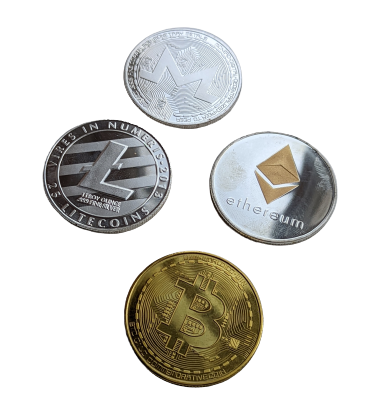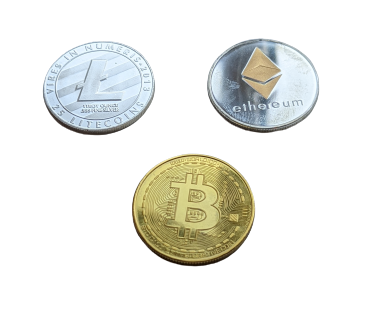
Crypto Beginners
Looking to understand more about crypto?
This website will give a little background to crypto, how to obtain and trade cryptocurrencies and help you understand your crypto goals.

What is a Cryptocurrency?
A cryptocurrency is a type of digital currency that uses cryptography and a distributed ledger system (usually a blockchain)
Cryptocurrencies allow you to buy goods and services, trade or sell for profit
Similar to electronic money we use today (VISA/Mastercard) but without any control from a central authority (i.e. big banks on the SWIFT system)
What is Cryptography?
crypt means hidden or vault and graphy means writings
Cryptography is a method of protecting information in communications through the use of mathematical equations with secret keys to encrypt and decrypt data, so that only those for whom the information is intended can read and process it.
A good analogy is when a package is posted to a street address. The address is public and can be read by anyone but only those who hold the keys to the address can open the package.
It provides secrecy and integrity, authentication and anonymity to our communications.
What is a Blockchain?
Blockchain is a type of distributed ledger (distributed database) that exists on multiple computers (called nodes) at the same time.
It is constantly growing as new sets of blocks are added to it, once added, these blocks are preserved forever.
The blockchain remains in sync across the distributed network and any computer with a different blockchain is rejected, thus maintaining data integrity.
The Blockchain acts as a single source of truth.
What is Bitcoin?
Bitcoin is the first decentralized blockchain cryptocurrency.
Invented in 2008 by an unknown person or group of people using the name Satoshi Nakamoto and started in 2009 when its source code was released as open-source software.
Rumours say that Bitcoin came about because of the 2007/2008 financial crisis which culminated with trillions of dollars in bail outs for the banks and richest in society. The makers of bitcoin hoped that a decentralised digital currency outside of the banking system would provide a fairer and honest monetary alternative.
What is a Transaction?
Cryptocurrencies are decentralised and the transactions are validated using key cryptography and a consensus mechanism. The most popular consensus mechanism is Proof of Work (PoW)
Transactions are authorised by persons holding a secret key or private key to transfer bitcoins from their bitcoin address to another bitcoin address. The private key proves ownership of a blockchain address and allows you to send crypto.
It is extremely important to keep your private keys safe and secure, and also secure backups of your private keys.
Similar to bank transactions, Bitcoin transactions are recorded on the blockchain with a timestamp, value and a From and To address. (The address is like your bank account number).
Next Section
How to get Crypto

Fiat Payment Gateways
A fiat payment gateway allows users to buy Bitcoin and other cryptocurrencies using fiat currencies ($, £, euro).
You need a crypto wallet address to send your purchased cryptocurrencies to.
All payment gateway services require Know Your Customer/Anti Money Laundering regulations so expect the same level of ID verification as you would if you were opening a bank account. See the regulations/privacy section for further information on KYC/AML.
Here are some popular fiat gateway services:
Crypto ATMs
Another popular choice is Crypto ATMs. These are kiosks that allows a person to purchase Bitcoin and other cryptocurrencies by using cash or debit card.
Buyers will typically scan a QR code corresponding to their own crypto wallet address, to which purchased coins are transferred.
Search for ATMs using Google or other online services:
Peer to Peer
Peer-to-peer crypto platforms facilitate trading of local currency for bitcoins and other cryptocurrencies.
Users post advertisements on the Peer-to-peer platform, where they state exchange rates and payment methods for buying or selling bitcoins.
The platform often acts as an escrow service (a legal arrangement in which a third party temporarily holds money or property until a particular condition has been met) and users are rated amongst the community and some platforms require KYC.
Here are some popular peer-to-peer platforms:
Mining
Mining is a Proof of Work (PoW) strategy in which transactions of cryptocurrencies are verified and new coins generated and added to the blockchain digital ledger.
It requires special software specifically designed to solve complicated, cryptographic mathematic equations and It requires knowledge of how to use the software
Most major crypto use super computers to mine as they have a better chance of solving being rewarded wth newly minted coins. Miners oftern form Mining PoolsTo increase their reward chances.
Crypto Mining is the virtual equivelent of mining for minerals in the earth, it requires work to get the minterals.
Mining (PoW) is still the most popular consensus mechanism in the crypto workd today.
Staking
The Proof of Stake (PoS) model allows owners of a cryptocurrency to stake coins to verify transactions. Your coins are locked up while you stake them, but you can unstake them after a given period of time.
Staking is a growing consensus mechanism and provides faster speed and efficiency with lower fees. A major way Proof of Stake reduces costs is by not requiring all those miners to churn through math problems, which is an energy-intensive process. Instead, transactions are validated by people who are literally invested in the blockchain via staking
Staking is similar to the way your bank pays you interest when you save your money in the bank.
Next Section
How to trade Crypto

Centralised Exchanges
A crypto exchange is a marketplace where you can buy and sell cryptocurrencies. e.g. You can trade BTC for LTC. The most popular types of crypto exchanges are centralised exchanges (CEX)
The major CEXs provide fiat to crypto services and often partner with Payment Gateway services to help provide a seamless user experience buying and trading crypto.
There are so many crypto exchanges across the world today and it is important to do your own research as a lot depends on the location and jurisdiction of the exchange and the country you reside in.
Popular exchanges include:
Decentralised Exchanges
A decentralized exchange or DEX for short, is a peer-to-peer service that allows direct cryptocurrency transactions between two interested parties.
DEXs provides a new sort of pair-matching service, allowing traders to place orders and trade cryptocurrencies without the need for an intermediary organization to manage the funds.
DEXs depend on self-executing smart contracts, most popular is the Ethereum protocol.
Decentralised finance in general is receiving a lot of growth, moving away from monolithic centralised parties.
Popular exchanges include:
Pros and Cons
-
CEX Pro
- High Liquidity and fast trades
- Low fees
- Fiat to cryto services
- Easy to use
-
CEX Cons
- Strict regulations (KYC/AML)
- Withdrawal limits and restrictions
- Risk of data breach
- Activity monitored
-
DEX Pro
- No KYC/AML regulations
- Full control of your cryptos
- Wider selection of tokens
- No withdrawal restrictions
-
DEX Cons
- Lower trading volumes
- Higher fees
- Not easy to use
- Less mature technology
Price fluctuations
The crypto markets are highly volatile resulting in huge price swings
It is important to do your research and define what your short and long terms goals are.
Understand that you could lose all of your investments, so only put in what you can afford.
Limit you emotion connection to the price swings and use your rational head whenever you make decisions. A lot of people have rushed into cryptos and lost money because they panicked on a big crash.
Next Section
How to store your Crypto

How do I store crypto?
Basially, this comes down to two options Custodial and Non-Custodial.
Custodial is where your coins are stored by another provider on your behalf like a brokerage service or on an exchange. You do not hold the private keys. They act like a bank does with your bank account.
Non-Custodial is where you hold your coins yourself on a software or hardware wallet. You hold the private keys.
Custodial
All exchanges offer custodial wallets for their clients and there are several popular custodial software wallets that you can install on your computer/mobile.
-
Pro
- Convenient and simple
- Easier for non-technical people
- Usually pretty secure
- Easy to trade
-
Cons
- You don't own your private keys
- Restrictions on your crypto access
- Cryptos could be seized
- Activity monitored by regulators
- Target of hackers
Non-Custodial
Non-Custodial wallets consists of hard wallets (cold storage), soft wallets (hot storage) and paper wallets. You are responsible for all of these types of non-custodial wallets
-
Pro
- You own the private keys
- Only you control your crypto
- Difficult to seize cryptos
- Lower spying on activity
-
Cons
- Not easy to trade quickly
- Requires more responsibility
- Requires more technical know-how
- Target of hackers
Cold wallets are the most secure because they are fully isolated i.e. no Internet access.
Hot wallets are encrypted and password protected. The private keys are stored on your computer/mobile. If your device is comprismsed then your cryptos are potentially comprised.
Paper wallets are printed pieces of paper containing private keys usually as a QR codes. These should be physically stored securely in a safe and are subject to same security risks as other physical valuables.
Security
Without security the whole crypto market would collapse. There has been numerous security issues with people getting the CEX accounts hacked or forgetting passwords for their wallets amongst other security probems, literally losses of billions of dollars! That's why security should be at the heart of any crypto strategy.
Here are some important security areas to pay attention to:
Passwords must be strong and remembered! Most CEXs provide a password reset facility but there is no option for that with non-custodial wallets.
Two Factor Authentication (2FA) applies to CEXs and is used on all major CEXs today and acts as an extra security layer after your password. Make sure you backup your 2FA keys in case you lose your phone. Authy and Google Authenticator are two popular 2FA apps.
For custodial wallets backup your private keys or seed phrase and keep them secure. A seed phrase is a list of words which store all the information needed to recover crypto funds on-chain.
Next Section
Privacy and financial freedom

Regulations
Since the inception of Bitcoin, regulations from governemnt and financial institutes have continued to grow and grow and the crypto industry is now heavily regulated
There is an emerging divide between centralised/controlled and decentralised/anonymous forces.
Regulators have a lot of control over the industry today and know who is transacting and the type of activity. For example, if you open a Coinbase account today and transfer your bitcoin to a dark web exchange, Coinbase would stop this transaction and freeze your account within 24 hours.
The goals of Bitcoin's original whitepaper was to enable monetary freedom by allowing people to transact among themselves without government or bank controls. However, today this is mostly untrue with Bitcoin.
Blockchain Analytics
Governments have invested huge sways of money into the crypto regulations and a major part of this is blockchain analysis. This allows the discovery of useful information about the different actors transacting in cryptocurrency.
Blockchain Analytics is becoming more sophisticated and in response to that there is a growing segment of the crypto industry that is moving away from the centralised/regulated model.
It allows regulators to track the type of transactional activity and whether this transaction was illegal or not. It also shows the amount of bitcoin on people's wallets and potentially disclose this to tax authorities.
If your Bitcoin transaction has a history of a illegal activities then it will be flagged as tainted and this transaction would be reported to the regulators. In order to be a true form of money, it requires Fungibility.
Fungibility
Fungibility is the property of a commodity whose individual units are essentially interchangeable and each of whose parts is indistinguishable from another part.
Silver and Gold coins were very funiglbe, because a 1-ounce coin of silver is the same value as any other 1-ounce coin and can be used interchangeably regardless of any past history.
Bitcoin and most other cryptocurrencies today are not fungible. There is a growing segment of bitcoin addresses that are tainted and are limited in their use.
The funding in support of the trucker protests in Ottawa has shown how easy it is for the government to freeze bank accounts as well as track bitcoin addresses to individuals.
There are additional layers built on top of bitcoin that help make bitcoin transactions more anonymous but the regulators are not far beind overcoming any privacy advances as at the core of bitcoin is the public blockchain which lists every transaction in its history.
Private Cryptocurrencies
In response to Bitcoin's privacy flaws, other cryptocurrencies have been developed to address this. These are known as Privacy Cryptocurrencies.
Privacy coins are fundamentally built with privacy-enhancing technologies that obfuscate transactions to achieve anonymity and fungibility
Most popular of the privacy coins is Monero (XMR). A top 50 crypto coin with a multi-billion-dollar marketcap. Most CEXs have stopped listing XMR as the transactions cannot be tracked. However, this has not stopped Monero, it is one of the most popular cryptocurrencies today and has a higher transaction rate than bitcoin.
Whilst XMR is the crypto of choice on the dark web, the vast bulk of its userbase are using it to protect themselves from government and banks, whom many people see as a threat to their freedoms and rights. You could argue that the drug laws create the majority of the criminal activity, education is more important than enforcement regarding drugs and ultimately it should be the choice of the person as long they don't harm anyone else.
The market for privacy coins has grown in recent years and it will be an interesting space to watch in the future. Here is a list of my preferences:
Central Bank Digital Currencies
In parallel to the growth of cryptocurrencies, Central Bank Digital Currencies (CBDC) have been quietly working in the background and this looks like it will be the future form of money and replace the fiat money we use today.
CBDCs is a centralised form of digital money and importantly it is programmable money and will be issued by the central banks, removing the need for intermediarty banks. CBDCs will record every single transaction you make, the transaction value, location, type of activity, the parties involved etc. and will be able to build transactional profiles of everyone and with AI, your behaviour can be controlled. e.g. You purchased an excessive amount of meat or travelled more than the average person this month or transacted with a political dissendent, the AI would increase your carbon taxes/penalities accordingly.
You can see that CBDCs have the capabilities of being the ultimate form of control over mankind, removing privacy and freedoms. You may roll your eyes and think 'conspiracy theory' but given the draconian actions of governments over the pandemic, you may want to pay attention and act to protect yourself.
Next Section
What is your strategy?

Ask yourself these questions
Given the information you've been presented with and understood, consider the following questions. Your answers should give you a better view of your crypto goals.
- Are your goals short term or long term?
- How much time and effort are you willing to put into your crypto venture?
- Is your main goal just profits in fiat money or financial independence or hedging against inflation?
- Do you want the responsilibty of managing and securing your own cryptos or do you prefer that to be managed by a custodial provider?
- Do you value privacy and freedom of your financial activities?
- Are you concerned about the overbearing nature of crypto regulations and government control?
- Are you concerned about the future stability of the financial system?
- Are you concerned about the new CBDCs and the level of control over society that brings?
More research
They say never put your eggs in one basket and for beginners in the crypto space, you should not invest 100% into a single area. Start off slowly and learn the basic processes before investing more and stepping further afield.
Find friends or engage with active crypto community members but be cautious as there are a lot of crypto scams about!
Write down your goals and prioritise them and then think where will you start and where you want to go.
Next Section
Consultation and Donations

Consultation
If you are interested in a one-to-one consultation to help you on your Crypto journey, get in touch:
Donations
Please consider donating if this information has helped you.






















